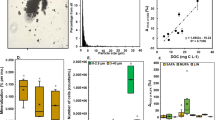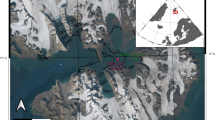Abstract
PHYTANIC acid and several lower isoprenoid acids are found in the marine food chain and in sediments. The mechanism of the degradation of phytol to phytanic acid is still uncertain. At least two pathways have been proposed and shown to occur in some cases1. One by way of dihydrophytol, another by phytenic aldehyde and phytenic acid. Phytenic acid was postulated recently2 as intermediate in the degradation of phytol in sediments and was mentioned among isoprenoid compounds in Mud Lake sediment3. It is formed from phytol thermo-catalytically in oxic conditions4.
This is a preview of subscription content, access via your institution
Access options
Subscribe to this journal
Receive 51 print issues and online access
$199.00 per year
only $3.90 per issue
Buy this article
- Purchase on Springer Link
- Instant access to full article PDF
Prices may be subject to local taxes which are calculated during checkout
Similar content being viewed by others
References
Lough, A. K., in Progress chem. fats and other tipids, 14 (edit. by Holman, R. T.), 5–48 (Pergamon, Oxford, 1973).
Ikan, R., Baedecker, M. J., and Kaplan, J. R., Geochim. cosmochim. Acta, 39, 187–194 (1975).
Bradley, W. H., Bull. geol. Soc. Am., 81, 985–1000 (1970).
De Leeuw, J. W., Correia, V. A., and Schenck, P. A., in Adv. org. Geochem. 1973, (edit. by Tissot, B., and Bienner, F.), 993–1004, (Editions, Technip, Paris, 1974).
Morrison, W. R., and Smith, L. M., J. Lipid Res., 5, 600–609 (1965).
Boon, J. J., de Leeuw, J. W., and Schenck, P. A., Geochim. cosmochim. Acta, 39, 1559–1569 (1975).
Farrington, J. W., and Quinn, J. G., Geochim. cosmochim. Acta, 35, 735–741 (1971).
McCarty, R. D., and Duthie, A. H., J. Lipid Res., 3, 117–120 (1962).
Skipski, V. P., Smolowne, A. F., Sullivan, R. C., and Barclay, M., Biochim. biophys. Acta, 106, 386–396 (1965).
Sonneveld, W., Haverkamp Begemann, P., van Beers, G. J., Keuning, R., and Schogt, J. C. M., J. Lipid Res., 3, 351–355 (1962).
Baxter, J. H., and Milne, G. W. A., Biochim. biophys. Acta, 176, 265–277 (1969).
Arpino, P., and Ourisson, G., Analyt. Chem., 43, 1656–1657 (1971).
Bhati, A., and Lloyd, K., Perfum. essent. Oil Res., 57, 699–701 (1966).
Mize, C. E., et al., Biochim. biophys. Acta, 176, 720–739 (1969).
Patton, S., and Benson, A. A., Biochim. biophys. Acta, 125, 22–32 (1966).
Brooks, P. W., and Maxwell, J. R., in Adv. org. Geochem.1973 (edit. by Tissot, B., and Bienner, F.), 977–991 (Editions, Technip, Paris, 1974).
Sever, J., and Parker, P. L., Science, 164, 1052–1054 (1969).
Author information
Authors and Affiliations
Rights and permissions
About this article
Cite this article
BOON, J., RIJPSTRA, W., DE LEEUW, J. et al. Phytenic acid in sediments. Nature 258, 414–416 (1975). https://doi.org/10.1038/258414a0
Received:
Accepted:
Issue Date:
DOI: https://doi.org/10.1038/258414a0
This article is cited by
Comments
By submitting a comment you agree to abide by our Terms and Community Guidelines. If you find something abusive or that does not comply with our terms or guidelines please flag it as inappropriate.



